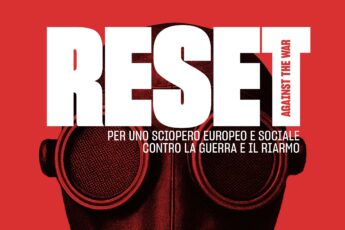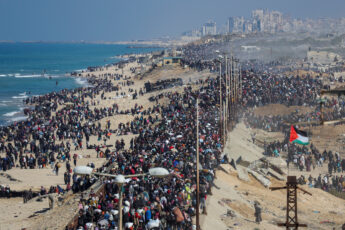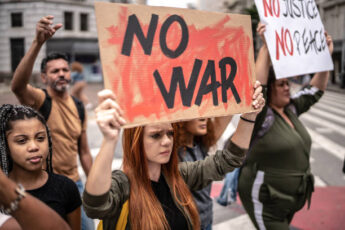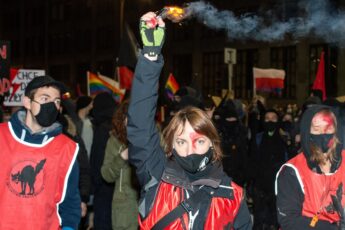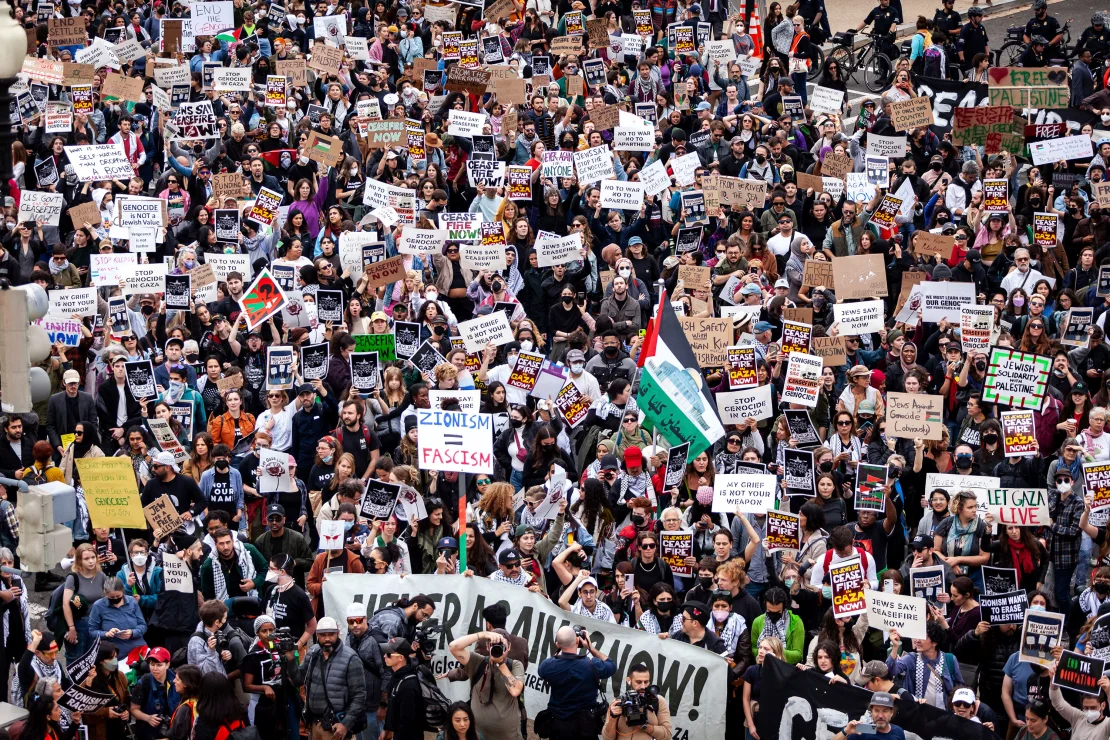
Since the beginning of Israeli bombings on Gaza, Jews Voice for Peace has been among the organizations most active in the United States in calling for an end of the genocide in Palestine by the Israeli military and in pressuring the Biden administration to stop sending weapons to Israel. Opposition to oppression, the apartheid regime, and the massacre of Palestinians has led thousands of Arabs, Palestinians, Jews, Blacks, students, and workers in the United States to take to the streets and reject the war and racist policies supported by the government both inside and outside the United States, challenging the censorship that has targeted every form of support for Palestine, from university campuses to workplaces. As explained by Ittai Kormai, an activist of Jewish Voice for Peace Triangle (North Carolina), since the beginning of the bombings on Gaza, various chapters of JVP across the country have been pressuring local representatives, and in Durham (NC) on February 20th, they succeeded, along with Mothers for Ceasefire and Durham Workers, in securing the approval of a resolution calling for a ceasefire in Gaza and an end to US military aid to Israel, making Durham one of about 70 cities in the country that have called for a ceasefire. As campaigns like #AbandonBiden continue in states where Democratic Party primaries are ongoing, partially forcing what protesters call «Genocide Joe» to backtrack, a Global Day of Action was called for March 2nd to stop the invasion of Rafah and the war, bringing hundreds of thousands of people to protest across the country. As was stated at the rally in Raleigh (NC), American support for the war in Gaza involves everyone and requires everyone to choose which side to stand on. Indeed, the project of domination, oppression, and racism that is fueling a mass massacre in Palestine is the same force allowing the trading of the lives of thousands of migrants at the Mexico border for the sending of weapons to Israel and Ukraine. The American war policy investing millions of dollars in supporting a genocide is the same policy imposing cuts to social spending and wages that are impoverishing millions of Americans.
Matilde Ciolli: Can you explain what Jewish Voice for Peace is and how you came to join it?
Ittai Korman: Jewish Voice for Peace is a US national organization and I am part of JVP Triangle, based in Durham, Raleigh and Chapel Hill in North Carolina. I have been a member for a long time and a more active member since November of 2023. Jewish Voice for Peace started when many Jewish activists decided to take a stand against the occupation of Palestine. It was important, for this movement, to make sure that there was a strong Jewish voice siding against the treatment of Palestinians, the land theft and the continued ethnic cleansing realized by the Israeli state since 1948. That has continued in 1967 and throughout the years. It is important to remove the idea that there is a Jewish state that represents all Jews and make sure that people understand that there is a Jewish diaspora that started long before the creation of Israel, that we have lived in many other places. A Jewish state does not necessarily mean the safety of Jews. If a nation-state called Israel is actively oppressing other people in an apartheid system, and currently committing genocide against these people, this does not equate with Jewish safety. We are not free until we are all free and we are not safe until we are all safe.
MC: Can you explain which stand did you take after the October 7th attacks by Hamas and then with the bombing of Gaza?
IK: I have been a co-leader of the working group for local elected officials. The JVP national strategy has been to put pressure on Congress, on officials to sign on to the bill supporting ceasefire and reject the bill giving more military aid to Israel. That has been the main strategy that JVP national has been doing and the many branches and many different chapters in different places have been following it. The Triangle JVP in North Carolina has been meeting with local elected officials here in the area and getting them to put pressure on our Congress members, starting with Valerie Foushee and now moving to our senators Deborah Ross, and Wiley Nickel.
MC: Talking about the bill that was supposed to send support to Israel, Ukraine and also some humanitarian aid to Palestine: there has been a kind of blackmail by the Republican Party, if the Democratic Party wanted to support these countries and their war, they had to close the borders with Mexico, minimizing access to the right of asylum. And Democrats proved ready to do so. So, do you think this war is increasing racism in the US? Did you take a stand as a Jewish Voice for Peace not only against sending weapons to Israel, but also against the racist part of the bill?
IK: We have seen a rise in Islamophobia in the past months, after this attack has happened. There were Palestinians who were attacked. There were people wearing keffiyehs who were attacked. And something also that has been really dangerous amongst the Jewish Zionist community is equating any stand against Israel as anti-Semitic. And this is dangerous not only for Palestinians because it is used to justify actions of genocide and apartheid, but it’s also dangerous for Jews living in the diaspora and in Israel because genocide does not make anybody safe. And when all of this ends, there may be sentiments against Jews, since the supposed Jewish state pretends to be representing Jews, but is not. So it’s dangerous on many, many levels. And I think that continuing to support it has dangerous implications and impacts on racism, Islamophobia and real anti-Semitism.
MC: And still concerning this bill, what is your view on the war in Ukraine?
IK: We don’t support any nation state bombing or using weaponry against another state and oppressing them. Most of us are anti-war activists as well. So we don’t agree with what has been going on. We have been focusing more on the genocide in Palestine, but our supporters and allies are working on the war in Ukraine as well.
MC: How has the Jewish community in the US reacted to your opposition to the war? Did you have to face any attempt to hinder your activities, rallies, demonstrations?
IK: No community is a monolith. So there were many different responses from Jewish community, ranging from support for Israel and for the continued destruction of Gaza to demands to stop the genocide, and to stop apartheid. I think that there’s been a wide response I have never seen in my lifetime. I have been an anti-Zionist basically my whole life because my parents were. I have never seen this much support for Palestine and this much criticism of Israel.
In the US society, more generally, there has been a lot of repression of the supporters of Palestinians, like for example on campuses. Many pro-Palestinian groups have been censored.
MC: You said that racism is increasing. The demonstrations for the ceasefire are participated by Jewish, black people, Arabs, Palestinian. How have these been built connections?
IK: The work that we have been doing has been in coalition with many, many different groups. There’s been Mothers for the Ceasefire, Black Youth Project 100, many different unions that have backed this issue because they see this, and we understand this as well, as an issue that is important in the United States. We should not be sending our money, our federal paid tax dollars to fund war when those things could be used to be serving working class people here. So, there is a deep connection between what’s going on there and how the US is supporting it and how we should not be funding genocide.
There are also many Palestinians and Palestinian Americans that live in the triangle area here in North Carolina, and we have worked with many of them. They are organized under different organizations: some with Muslim Women For, some with Students for Justice in Palestine, some with Mothers for Ceasefire. And we always try to take their lead on stances and support them and work collaboratively for peace.
MC: Were there disagreements that you had to work on in order to be able to organize together with Palestinian or Arab groups initiatives to end the conflict?
IK: Personally, I don’t think that we should be prescriptive in a solution. I think that we should say the US should no longer fund genocide. And so all the conversations around a one state solution or a two state solution or anything around that, or whether intifada is the way to move forward or not, those are not decisions for us to prescribe here in the US. What is important for us is to say is that we do not stand with genocide, and we do not want to fund it and we will press our Congress members to feel the same way. I don’t support erasing Israel as a solution, as I don’t support erasing Palestine. My parents were both born and raised in Israel, we currently have some land in Israel, and my family and I are thinking about supporting and joining and continuing the land back movements that are giving land back to Palestinians. I don’t think that many Palestinians who I’ve been organizing with want to erase all of Israel. I think that they just want to be able to live on the land that they have been living on. In terms of how you reconcile what happened in 1948 and then 1967 and then 1982 and then 2004: I don’t know how you reconcile that and how you deal with all the people who were displaced and killed and kicked out of their land. But in terms of the direct organizing that we’re doing here, those aren’t necessarily the questions that we’re focused on. But I think it’s a constant question of how you have reparations, similar to the conversations that some have had here in the US. And we should continue to have that. We are on stolen land and much of the wealth that has been created here is from stolen labor. So the question is, how do you reconcile that and how do you live with the history and honor it and try your best to repair it? I don’t know the answer to it. My hope comes from my paternal grandmother, whose family moved from Morocco to Palestine in 1892, when there was no so-called Jewish state of Israel. But there were many Jews that lived amongst Palestinians of many different faiths, and there they did so peacefully. The problem was creating a Zionist nation-state that became repressive and enacted apartheid. But in the short-term, what we first need is to stop genocide and not allow the giant empire of the US to fund it, and, let those who are living on that stolen land try to repair the damage that has been done.


